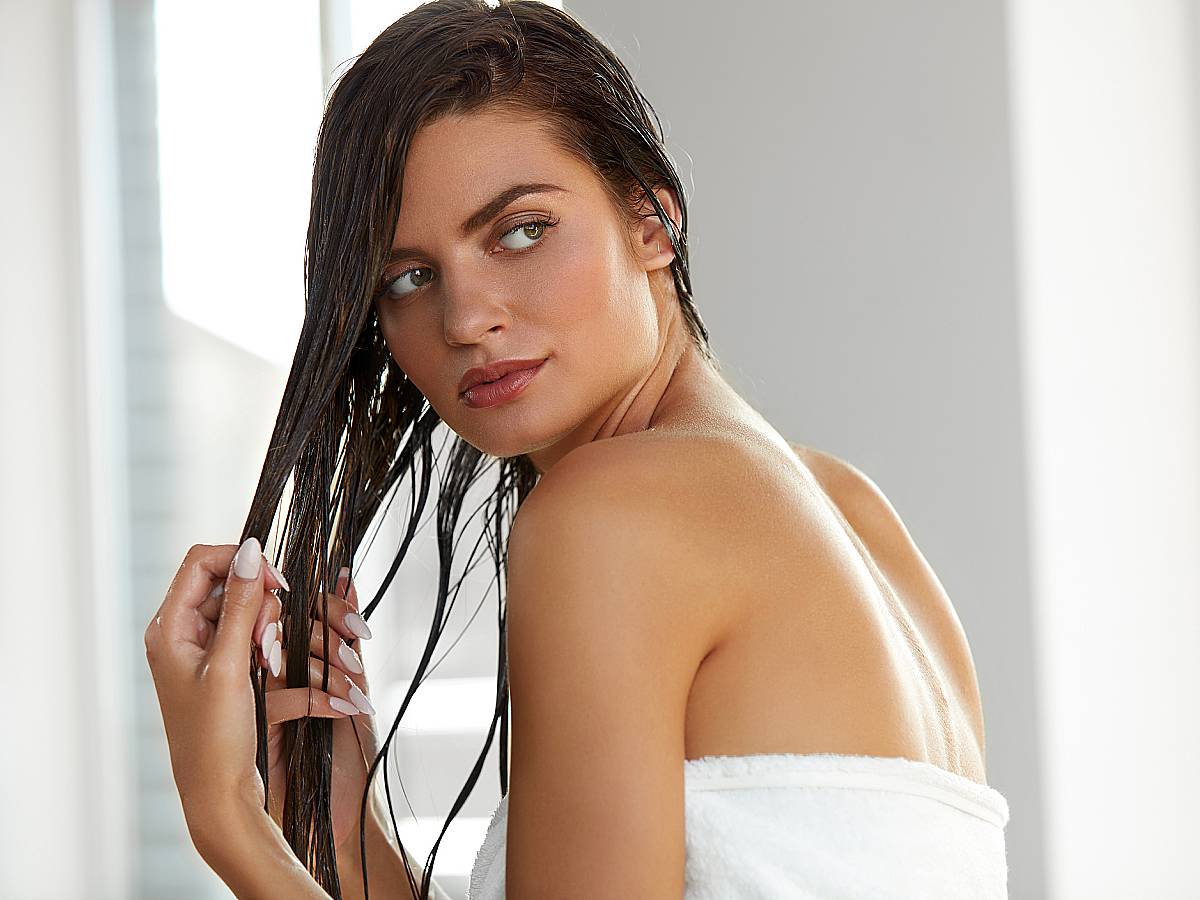Reader question:
Hello Cindy,
I’ve noticed my hair has been feeling kind of straw-like and dull, and I’m wondering if it could be because of the hard water in my apartment. I’ve got this wavy texture that used to be so easy to manage, but now it’s just frizz and tangles. Any pro tips on how to handle this? Is there something I can do at home to turn things around?”
Laura Shacklette
Bowling Green, Kentucky
Hello, Laura! I know living in an apartment makes it hard to control how hard or soft your water is. Unfortunately, having shiny, healthy hair takes a bit of work. Using a quality shampoo and conditioner goes a long way towards helping your locks stay lush. But, there is one element in your shower that could cause damage without you even knowing it.
Hard water can cause your hair to go brittle over time because of the chemicals and minerals that are used to treat the water. It can also strip out your color, or even affect the tone of your hair color.
Hairdressers like Jessica Le from Icon Hair in Scottsdale, AZ, and Jillian Allen at Bespoke Salon in Phoenix, AZ, have both witnessed the impact of hard water on hair health.
When I asked Jillian about hard water affecting hair, she said, “My clients that have moved to Phoenix from other states immediately notice a difference in their hair as a result of the hard water. They tell me that their hair feels drier, weighed down, tangled, and the color fades faster. The usual culprit? Arizona water.” She also shared some pro tips, which I’ll share a bit later.
In Jessica’s experience, “Washing with hard water is awful. A client found out there was copper in her water after her blonde hair was starting to turn green even though she wasn’t a swimmer.”
While the signs of hard water on hair are clear as day, finding a fix can be frustrating. That’s why I put together this ultimate guide for identifying hard water and protecting your tresses.
In this article, you’ll learn:
- What hard water is. Hard water is water that has a high mineral content.
- What hard water does to hair. Hard water makes hair stiff, dry and brittle, and I’ll show you just how to avoid this problem.
- Where hard water is commonly found. Hard water is most common in geographical locations that have naturally high levels of gypsum and limestone.
- Why hard water damages hair. Water might look clear but it has minerals in it that can coat your delicate strands.
- Ways to know if you have hard water. Watching for these signs can tell you if hard water is the reason for your damaged hair.
- Types of hair that are most vulnerable to hard water damage. If your hair falls into these categories, you’ll want to be extra vigilant with your hair care.
- How to prevent and restore damaged hair. Here’s where you’ll find usable tips that help you get your hair healthy again.
- Frequently asked questions about hard water damage. Whether you’re wondering about grays or an itchy scalp, you’ll find your answers here.
What Is Hard Water?
Hard water is the presence of excess minerals — notably, calcium and magnesium. These minerals don’t do well in liquid form and are apt to attach to surfaces and become hard.
In this way, if you have hard water in your home, you’ll notice a scaly appearance on any wet surfaces. In your bathroom and kitchen, mineral deposits will appear on faucets, sinks, and shower walls. You’ll also notice buildup in any places where water often splashes or pools.
Unfortunately, mineral deposits will also occur on your hair. Over time, this makes your locks dull, dry, and brittle.
What Does Hard Water Do to Hair?
Think for a moment about how your hair feels after swimming in the ocean. Those crunchy beach waves are the product of having minerals stick to your hair from the salt water. While this effect might be desirable during a temporary vacation, the minerals in hard water can start to cause serious damage over time.
Eventually, hard water deposits create a cast on your hair that is hard to get off. This can cause your hair to get brittle and lose its elasticity. You might also notice that your hair feels dry and loses its color and luster. In a worst case scenario, hard water can contribute to hair loss and problems with your scalp such as eczema (source).
Where Is Hard Water Found?
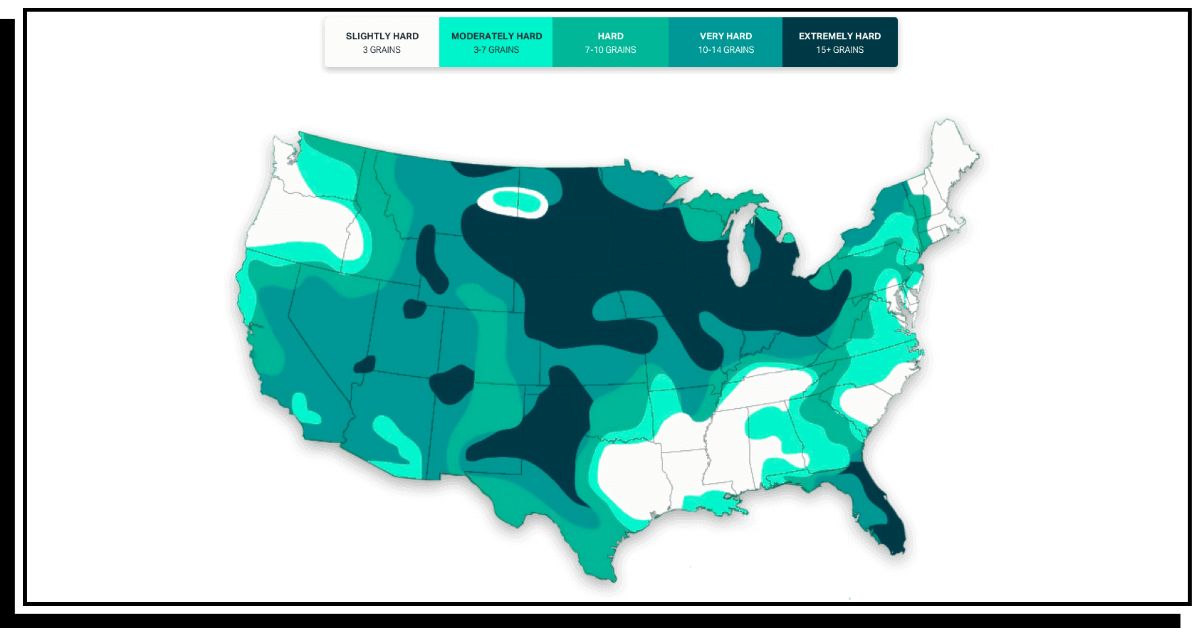
Hard water is found in approximately 85% of US homes. (Source) If your home is one of them, hard water flows out of every single tap and shower head you have.
The source of your water doesn’t play a huge role in hardness. It’s true that well water is usually chock-full of calcium and magnesium. But water from treatment plants can contain these same minerals.
Figuring out if you have hard water takes a little investigating, but there are some telltale signs that you might be able to spot right away. Hard water also leaves mineral deposits on other things it touches.
If you’ve ever noticed spots on the dishes after you wash a load, then you have seen these minerals first hand. You might also notice a murky film on glass shower walls along with lower water pressure from the deposits building up in the pipes and shower heads.
Your hair can also give you a few clues. Finding it hard to get a good lather is a sign that minerals are interacting with the cleanser in your shampoo. Your hair will also feel dry and have serious tangles, even after using a quality conditioner.
If you suspect that you have hard water and want to know for sure, then the best way to find out is by using a test that checks the hardness. You can purchase one for around $20 at your local hardware store. If the test reveals that there are high numbers of minerals running through the pipes, installing a water softener or shower head filter will lower the levels.
The Reason Hard Water Damages Hair
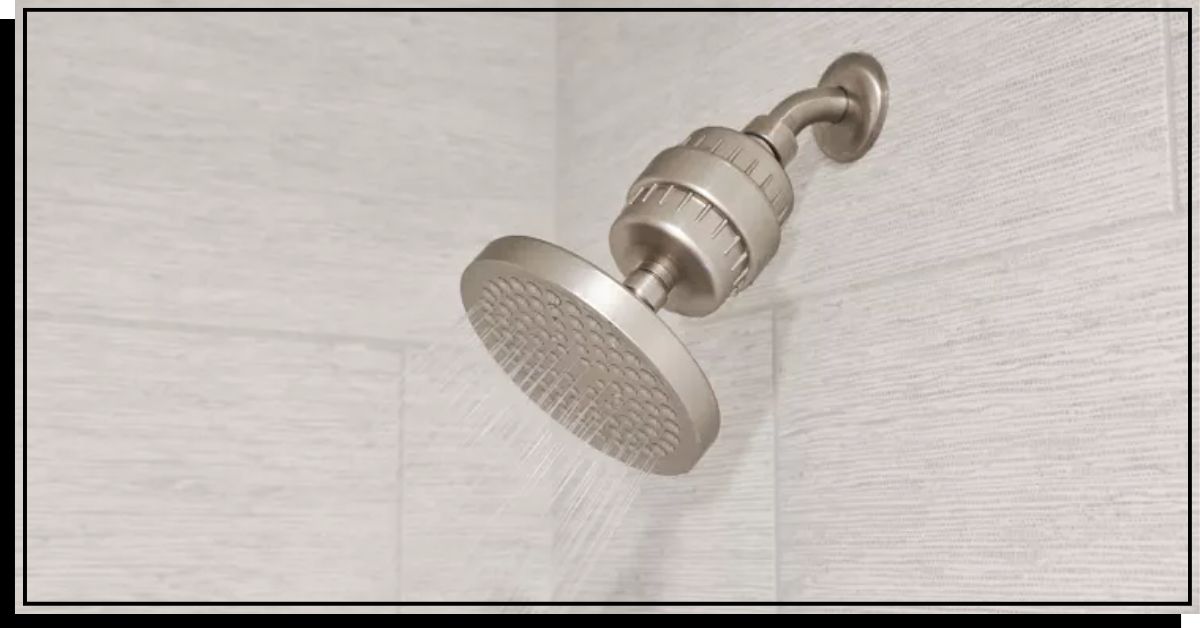
Hard water does two main things to make hair feel and appear dry and brittle.
First, it attaches to your scalp and around each strand of hair. This buildup closes off each hair from getting the necessary moisture. Even worse, it can actually strip your hair of its natural oils.
Next, this buildup makes each hair thicker with a fine film. Imagine the scaly buildup you see on your faucet encasing each strand of your hair. Now you have a better idea of why this water feature causes such a dull and dry appearance.
I asked Jessica for her thoughts on the matter, too. She told me, “Water, hard or softened, can break down some of the bonds in the hair.
When you factor in any chemicals or minerals that are in hard water, there are definitely more bonds that can be broken or damaged that affect the elasticity and strength of the hair. These bonds, hydrogen and salt bonds, are the ones that are affected the most by water.
Other than the internal bonds, there can be mineral buildup on the outside of your hair strand and that can cause your hair to lackluster, change texture, and even react differently to chemicals.”
I couldn’t have said it better myself!
3 Signs of Hard Water on Hair
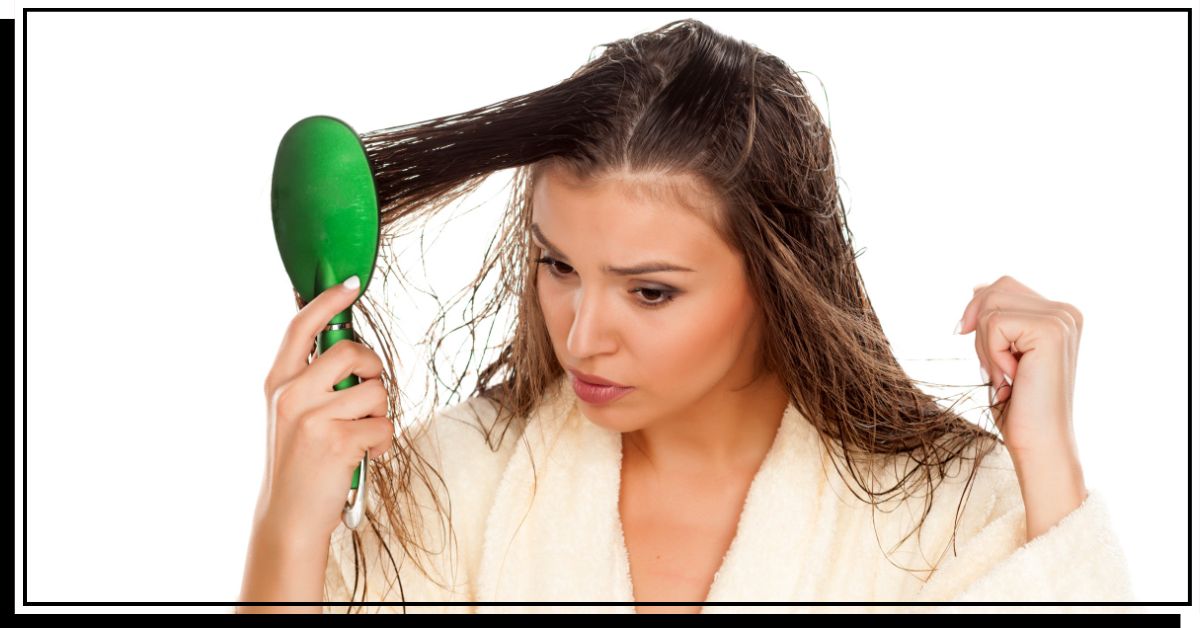
Not sure if hard water is the cause of your lackluster locks?
In some cases, judging your own water hardness can be difficult. Here are 3 telltale signs of hard water on hair:
1. Hair Breakage and Damage
Unfortunately, your hair is just like any other surface to hard water. Does the water in your home tend to calcify on surfaces? (Think water spots on dishes and white mineral deposit buildup on shower drains.) If so, it’s calcifying on your hair too.
This buildup will cause each of your hairs to become weaker. Over time, every strand gets cut off from necessary moisture and nutrients.
Another symptom of hard water build-up on the scalp could be irritation, burning sensation, or rashes.
Strong healthy hair has great elasticity, so even when it’s tugged on, it can stay strong and bounce back into place. Weak hair lacks elasticity in the hair shaft. This means any tug or pull (when brushing or combing, for example) may result in hairs snapping.
Take a close look at your hair. Do you notice many shorter hairs, general frizz, and dullness? These could be signs of hair breakage caused by hard water.
2. Hair Loss
With repeated use of hard water, you’ll notice your hair breaking more and more. Over the course of time, this can lead to significant hair loss.
It can be difficult to know if you’re really losing hair. The hair you find in your shower drain or on your pillow might be normal, healthy shedding. According to the Cleveland Clinic, “On days when people with long or thick hair wash it, they could shed between 150 and 200 hairs”. (Source)
This may seem like a lot, but it only amounts to a small hairball. Are you losing more than that each day? Then you could be suffering more hair loss due to persistent washing with hard water.
In the future, this issue could even cause inhibited hair growth.
3. Dry, Brittle Hair
Finally, hard water prevents your hair from receiving adequate moisture. This can leave it looking and feeling dry and brittle.
Unfortunately, it also means that investing in moisturizing hair products won’t help. Your locks won’t get the hydration they need because of the mineral buildup around each hair strand. The minerals create an impenetrable layer– and you have to remove the buildup first.
The Hair Types Most Susceptible to Hard Water Damage
In truth, no one’s hair is safe from the negative effects of hard water. However, some hair types are more susceptible to damage than others.
Before discussing which hair types fare the worst with this issue, let’s talk about your hair type. Several factors determine a person’s hair type:
- Diameter determines whether your hair is fine or coarse
- Density determines whether your hair is dense or thin
- Porosity determines whether your hair is absorbent or non-absorbent (Both absorbent and non-absorbent hair will look dull and greasy with regular hard water use)
- The shape determines if your hair is straight, curly, or wavy
Based on these factors, the following hair types tend to suffer most with regular hard water use.
Fine Hair
Fine hair is prone to buildup from many substances. Shampoo and conditioner, styling products, and even environmental pollution can be problematic. This delicate hair type requires extra care in many respects.
The benefit of fine hair is that, when healthy, it looks fresh and shiny. Unfortunately, hard water buildup can cause fine hair to look especially dull and dry.
To know if you have fine hair, pinch one strand between your thumb and forefinger. Gently slide your fingers down the strand. If you almost can’t feel the hair– or can’t feel it at all– you have fine hair. The diameter of each hair strand is small, so your hair is more delicate than other types.
Low-Porosity (Non-Absorbent) Hair
To a certain extent, we want our hair to be a bit porous. Porosity allows moisture to get in and helps keep hair shiny and lustrous. In this vein, low-porosity hair may appear more brittle and dry to begin with.
But hard water exacerbates low porosity. So if you have low-porosity hair to begin with, you’ll notice more issues with regular hard water use.
Oil and moisture will have an even harder time penetrating each hair strand. In both texture and appearance, the results won’t be favorable.
Curly Hair
Lastly, curly hair is more susceptible to hard water damage. The buildup of hard water minerals will weigh your curls down. (Source) This causes them to fall flat and appear stringy rather than full and shiny.
Even wavy hair can suffer these effects. Hard water will also straighten and stretch out each strand of hair, meaning you may not have curls at all. Typically bouncy curls may appear only wavy. Beautiful waves will fall flat, looking lusterless and straight-ish.
Color Treated or Bleached Hair
Coloring or bleaching your hair involves using chemicals that rough up the shaft and strip away the natural oils. This causes your hair to be more porous, which creates additional room for minerals to deposit. Deep conditioning treatments help restore your hair’s natural oils and texture after a coloring session.
Afro, Curly or Frizzy Hair
Having curls is an asset when it comes to creating distinctive hairstyles, but it does come with one major drawback. All of those tight curls make it hard for natural oils to work their way down each strand. Without those oils blocking the pores in your hair, the minerals have an easier time getting inside.
The same is also true for frizzy hair. Frizziness often indicates that your hair is porous and allows moisture to get inside. Where there’s moisture, there’s also likely to be calcium and other deposits just waiting to crystallize.
How to Prevent and Repair Hard Water Damage to Your Hair
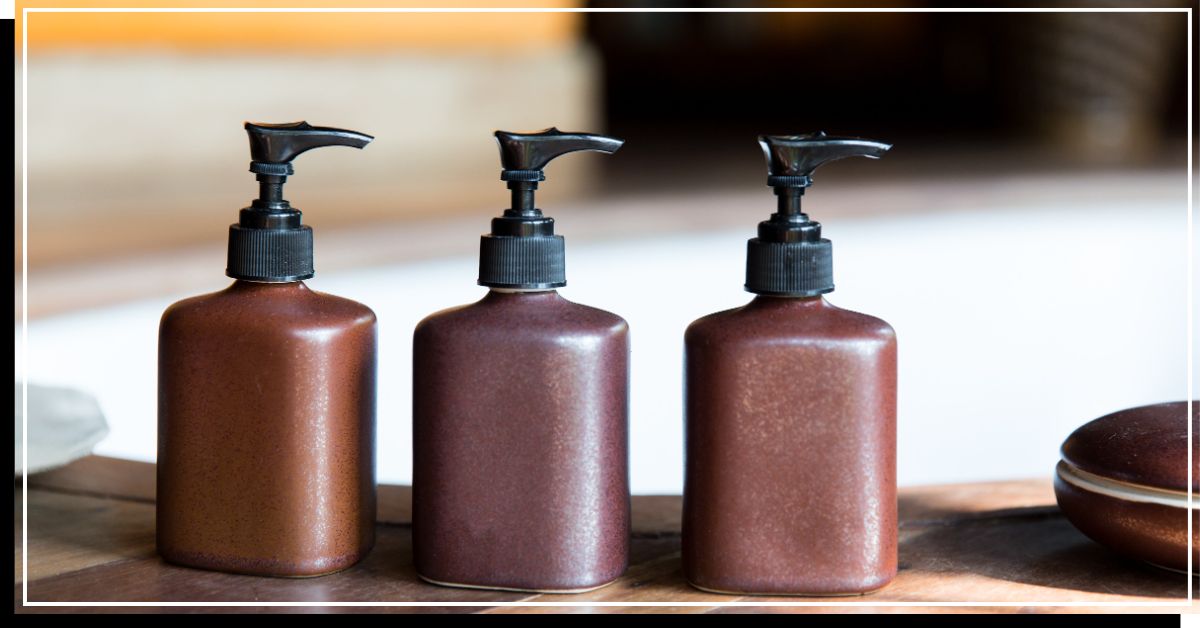
Here are 3 things you can do to bring your hair back to life after experiencing hard water damage.
Add a Filter to Your Shower Head
A shower water filter is one of the most effective ways to improve the effects of hard water. It eliminates hard minerals before the water exits your showerhead. This cuts hard water off at the source!
There are 2 basic types of shower head filters. The first type is fitted between your shower arm and the shower head (called inline filters). You can also buy one that includes a showerhead (an all-in-one model).
There are benefits to both, so choose the one that works best for you.
If you love your current showerhead, for example, you may choose an inline filter. It attaches to your shower arm (the pipe that comes out of the wall in your shower).
Use Pre-Shampoo Treatments to Prevent Hard Water Damage
You apply pre-shampoo (also called “pre poo”) treatments to your scalp and hair before getting in the shower. They help protect each strand and your scalp from the negative effects of hard water.
This Organic Virgin Coconut Oil is my favorite treatment for dry, frizzy, or damaged hair. For normal to oily hair, try this Organic Virgin Jojoba Oil.
Both of these options are organic, sustainably sourced, and cruelty-free. You can feel good about yourself and the environment with these on your shelf.
To prevent damage to the hair shaft, massage in enough oil to lightly coat your hair. Do this 5 to 10 minutes before hopping in the shower or bath. For a scalp-only treatment, use a small glob of coconut oil or about 5 drops of jojoba oil. Then, spend a moment massaging it into your scalp.
Next, wash and condition your hair as usual. For more moisture penetration, you can leave the oil on your hair for an hour or so.
Repair Hair With a Clarifying or Chelating Shampoo
You see, even with regular washing, any hair product can leave residue on your hair. Clarifying and chelating shampoos are designed to remove the buildup safely.
But keep in mind that clarifying and chelating shampoos aren’t meant for daily use. They’re a bit too strong for that. That said, clarifying shampoo tends to be less hard on your hair. It’ll only remove the outermost mineral and product buildup from your hair shaft.
Chelating shampoos actually remove mineral buildup from the inside of the hair shaft. This is because these shampoos have a low pH in contrast to clarifying shampoos, which have a high pH.
When used once every 1 or 2 weeks, these products can drastically improve the luster and texture of your hair. I recommend the Malibu Hard Water Wellness Kit as a color-safe chelating shampoo and conditioner set. My favorite color-safe clarifying shampoo is Kenra Clarifying Shampoo.
A Natural Solution: Apple Cider Vinegar Rinses
If you prefer to use nature to heal your hair, then you also have an effective option. Apple cider vinegar is acidic, which helps to restore the delicate pH balance in your hair.
Bragg Organic Apple Cider Vinegar is ideal for all hair types. Just mix five parts filtered water with one part of vinegar in a spray bottle. Then, spray your hair and let it sit for five minutes before rinsing it out. Doing this twice a month or every other week helps to remove and prevent build-up before it destroys your hair.
Frequently Asked Questions
Does hard water make hair feel like straw?
Yes, persistent washing with hard water may make your hair have a straw-like texture. The mineral buildup acts like a coating on your hair, making each strand drier and more brittle.
Can hair damage from hard water be reversed?
Yes, hair damage from hard water can be reversed. Utilizing special hair treatments or adding a showerhead filter are the fastest methods.
How long does it take to reverse the effects of hard water on hair?
Following changes to your showerhead filter and hair products, you should notice an improvement after 2 or 3 washes. But know that in some cases, it may take several months to see a full reversal.
Is hard water hair fall permanent?
Hair fall due to hard water isn’t permanent. You can improve this issue by switching to soft water (by using a water filter, for example). You may also want to try chelating shampoos and pre-shampoo treatments.
How can you tell if hard water has damaged your natural hair?
Hard water damage results in strands that are dry, brittle, and dull. If the damage becomes extensive, then you may also see breakage or patches of hair loss.
Does hard water cause gray hair?
Hair turns gray as the follicles gradually produce less color over time. While hard water doesn’t technically turn your hair gray, periods of rapid hair loss from the damage can cause those silver strands to emerge more quickly.
Can hard water cause an itchy scalp?
The minerals in hard water can cause irritation to the skin on your scalp. Eczema, psoriasis, and dandruff are a few scalp conditions that are affected by hard water and can lead to itchiness.
Can hard water cause hair to change color?
Hard water can often cause hair color to fade and appear dull, whether the hair is dyed or natural, according to Jessica, a stylist. She explains that “The mineral buildup from hard water can have a funky reaction to color and cause it to fade so much more quickly.” The recommended solution is to get a water softener or use a water filter that can be attached to a shower head.
Another stylist, Jillian, shares a particular experience with a client whose blonde hair kept turning brassy due to hard water. The issue was resolved through an intensive salon treatment and a change in her home haircare routine, including using a water filter and a bi-monthly clarifying shampoo.
